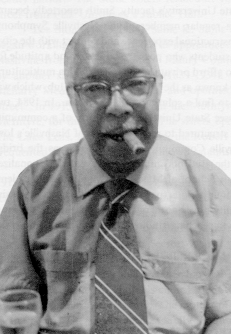 William Oscar
Smith was born in Bartow, Georgia, to William O. and Ida B. Smith on May
2, 1917. Due to threats his father received from local white supremacists,
six months after Smith's birth the family moved to Philadelphia, Pennsylvania.
Reared in Philadelphia, W. O. received his education in the city schools
and was graduated from Benjamin Franklin High School. After graduating
from high school, he entered the Mastbaum Vocational School of Music. Subsequent
to attending Mastbaum, Smith matriculated at Lincoln University and in
1937 entered New York University (NYU), New York City. While a student
at NYU, Smith, a bassist, gained practical music experience playing with
noted persons such as Bessie Smith, Fats Waller, Dizzy Gillespie, and Coleman
Hawkins.
William Oscar
Smith was born in Bartow, Georgia, to William O. and Ida B. Smith on May
2, 1917. Due to threats his father received from local white supremacists,
six months after Smith's birth the family moved to Philadelphia, Pennsylvania.
Reared in Philadelphia, W. O. received his education in the city schools
and was graduated from Benjamin Franklin High School. After graduating
from high school, he entered the Mastbaum Vocational School of Music. Subsequent
to attending Mastbaum, Smith matriculated at Lincoln University and in
1937 entered New York University (NYU), New York City. While a student
at NYU, Smith, a bassist, gained practical music experience playing with
noted persons such as Bessie Smith, Fats Waller, Dizzy Gillespie, and Coleman
Hawkins.
Two years after he enrolled in NYU, Smith "thumped" his way into jazz history by playing for the now-classic Coleman Hawkins recording of Body and Soul. In June of 1942, he was graduated from NYU with a Bachelor of Arts degree. Smith continued his academic training, earning a graduate degree from the University of Texas at Austin and the Doctor of Philosophy degree form the University of Iowa at Iowa City.
During World War Two, Smith was stationed at Fort Huachucha, Arizona, as band director in the Thirty-seventh Special Services Company, U. S. Army. While in the service, he met a young woman named Julia (maiden name undetermined), whom he married; in 1944 they became parents of W. O. Smith, III. After his tour of military service ended, he returned to New York and taught at the Seward Park High School.
In 1945, Smith participated in a recording session with Max Roach and Dizzy Gillespie. Later in the same year, he moved to Baltimore, and at Morgan State College he met Catherine Leeds, to whom he was married in 1948. They became the parents of three children: Jacqueline, Jay, and Joel. As he wrote in his autobiography, Sideman. The Long Gig of W 0. Smith (1991), when he moved to Baltimore, he "effectively left behind [his] chance to become a big name in jazz." Smith displayed his musical capability at noted spots of entertainment such as the Cotton Club and the Savoy Ballroom. In 1952, W. O. Smith and his family moved to Nashville, where he began his thirty-year tenure on the faculty of Tennessee Agricultural and Industrial State University. Dr. Smith's educational, musical, and cultural endeavors in his adopted city made him a force with which to be reckoned.
Subsequent to joining Tennessee State University's faculty, Smith reportedly became the second African American to become a regular member of the Nashville Symphony, playing in the viola and bass sections. His instructional experience and contact with the city's school system made him painfully aware of students who possessed a desire and aptitude for music but lacked the financial wherewithal to afford private lessons. Through a multicultural gathering of interested community members known as the Wednesday Night Club, which was founded by Smith, he articulated his desire to find a solution to the problem. In 1984, two years after Smith's retirement from Tennessee State University, his vision of a community music school came to fruition. Specifically structured to meet the needs of Nashville's low income students, the W. O. Smith / Nashville Community Music School was the bridge between the city's public schools, where the students' multitude prevented personalized training on a one-to-one ratio, and the Ellair School of Music, a private musical academy where the $300 cost for fifteen weekly half-hour periods (payable in advance) was preclusive for under-privileged persons. The community music academy was established in the inner city at 1416 Edgehill, where it provided seven teaching studios, a waiting room, and office space.
Dr. William Oscar Smith died on May 31, 1991. His remains were interred in Woodlawn Cemetery, Nashville.